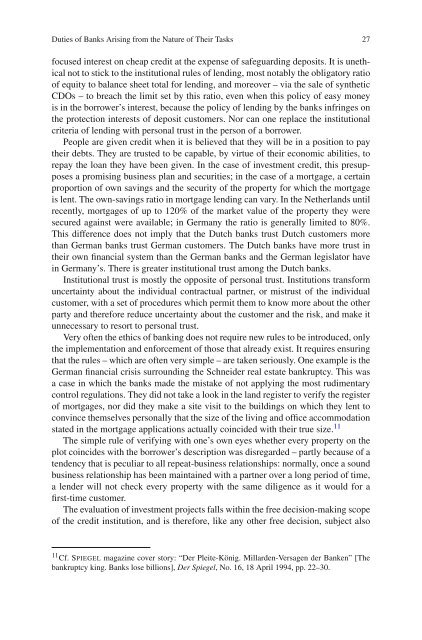The Ethics of Banking: Conclusions from the Financial Crisis (Issues ...
The Ethics of Banking: Conclusions from the Financial Crisis (Issues ...
The Ethics of Banking: Conclusions from the Financial Crisis (Issues ...
You also want an ePaper? Increase the reach of your titles
YUMPU automatically turns print PDFs into web optimized ePapers that Google loves.
Duties <strong>of</strong> Banks Arising <strong>from</strong> <strong>the</strong> Nature <strong>of</strong> <strong>The</strong>ir Tasks 27<br />
focused interest on cheap credit at <strong>the</strong> expense <strong>of</strong> safeguarding deposits. It is unethical<br />
not to stick to <strong>the</strong> institutional rules <strong>of</strong> lending, most notably <strong>the</strong> obligatory ratio<br />
<strong>of</strong> equity to balance sheet total for lending, and moreover – via <strong>the</strong> sale <strong>of</strong> syn<strong>the</strong>tic<br />
CDOs – to breach <strong>the</strong> limit set by this ratio, even when this policy <strong>of</strong> easy money<br />
is in <strong>the</strong> borrower’s interest, because <strong>the</strong> policy <strong>of</strong> lending by <strong>the</strong> banks infringes on<br />
<strong>the</strong> protection interests <strong>of</strong> deposit customers. Nor can one replace <strong>the</strong> institutional<br />
criteria <strong>of</strong> lending with personal trust in <strong>the</strong> person <strong>of</strong> a borrower.<br />
People are given credit when it is believed that <strong>the</strong>y will be in a position to pay<br />
<strong>the</strong>ir debts. <strong>The</strong>y are trusted to be capable, by virtue <strong>of</strong> <strong>the</strong>ir economic abilities, to<br />
repay <strong>the</strong> loan <strong>the</strong>y have been given. In <strong>the</strong> case <strong>of</strong> investment credit, this presupposes<br />
a promising business plan and securities; in <strong>the</strong> case <strong>of</strong> a mortgage, a certain<br />
proportion <strong>of</strong> own savings and <strong>the</strong> security <strong>of</strong> <strong>the</strong> property for which <strong>the</strong> mortgage<br />
is lent. <strong>The</strong> own-savings ratio in mortgage lending can vary. In <strong>the</strong> Ne<strong>the</strong>rlands until<br />
recently, mortgages <strong>of</strong> up to 120% <strong>of</strong> <strong>the</strong> market value <strong>of</strong> <strong>the</strong> property <strong>the</strong>y were<br />
secured against were available; in Germany <strong>the</strong> ratio is generally limited to 80%.<br />
This difference does not imply that <strong>the</strong> Dutch banks trust Dutch customers more<br />
than German banks trust German customers. <strong>The</strong> Dutch banks have more trust in<br />
<strong>the</strong>ir own financial system than <strong>the</strong> German banks and <strong>the</strong> German legislator have<br />
in Germany’s. <strong>The</strong>re is greater institutional trust among <strong>the</strong> Dutch banks.<br />
Institutional trust is mostly <strong>the</strong> opposite <strong>of</strong> personal trust. Institutions transform<br />
uncertainty about <strong>the</strong> individual contractual partner, or mistrust <strong>of</strong> <strong>the</strong> individual<br />
customer, with a set <strong>of</strong> procedures which permit <strong>the</strong>m to know more about <strong>the</strong> o<strong>the</strong>r<br />
party and <strong>the</strong>refore reduce uncertainty about <strong>the</strong> customer and <strong>the</strong> risk, and make it<br />
unnecessary to resort to personal trust.<br />
Very <strong>of</strong>ten <strong>the</strong> ethics <strong>of</strong> banking does not require new rules to be introduced, only<br />
<strong>the</strong> implementation and enforcement <strong>of</strong> those that already exist. It requires ensuring<br />
that <strong>the</strong> rules – which are <strong>of</strong>ten very simple – are taken seriously. One example is <strong>the</strong><br />
German financial crisis surrounding <strong>the</strong> Schneider real estate bankruptcy. This was<br />
a case in which <strong>the</strong> banks made <strong>the</strong> mistake <strong>of</strong> not applying <strong>the</strong> most rudimentary<br />
control regulations. <strong>The</strong>y did not take a look in <strong>the</strong> land register to verify <strong>the</strong> register<br />
<strong>of</strong> mortgages, nor did <strong>the</strong>y make a site visit to <strong>the</strong> buildings on which <strong>the</strong>y lent to<br />
convince <strong>the</strong>mselves personally that <strong>the</strong> size <strong>of</strong> <strong>the</strong> living and <strong>of</strong>fice accommodation<br />
stated in <strong>the</strong> mortgage applications actually coincided with <strong>the</strong>ir true size. 11<br />
<strong>The</strong> simple rule <strong>of</strong> verifying with one’s own eyes whe<strong>the</strong>r every property on <strong>the</strong><br />
plot coincides with <strong>the</strong> borrower’s description was disregarded – partly because <strong>of</strong> a<br />
tendency that is peculiar to all repeat-business relationships: normally, once a sound<br />
business relationship has been maintained with a partner over a long period <strong>of</strong> time,<br />
a lender will not check every property with <strong>the</strong> same diligence as it would for a<br />
first-time customer.<br />
<strong>The</strong> evaluation <strong>of</strong> investment projects falls within <strong>the</strong> free decision-making scope<br />
<strong>of</strong> <strong>the</strong> credit institution, and is <strong>the</strong>refore, like any o<strong>the</strong>r free decision, subject also<br />
11 Cf. SPIEGEL magazine cover story: “Der Pleite-König. Millarden-Versagen der Banken” [<strong>The</strong><br />
bankruptcy king. Banks lose billions], Der Spiegel, No. 16, 18 April 1994, pp. 22–30.

















